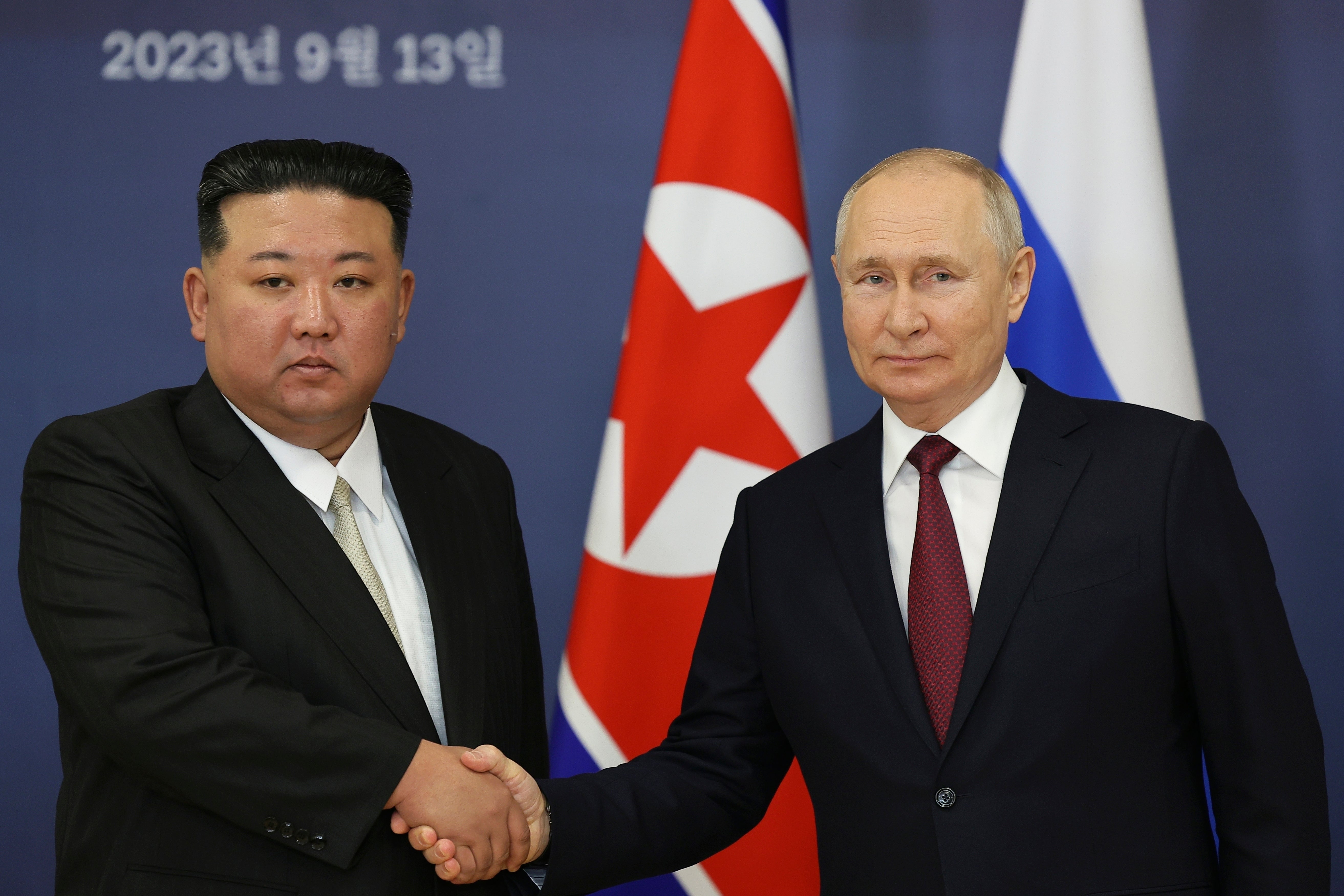The Putin-Kim bromance is a dangerous liaison
Editorial: Rather than the forging of a new axis against Western influence, the Russian president’s rare visit to North Korea is a telling sign of his weakness – and how, to declare victory in Ukraine, he may be prepared to take risks

There was a time, many decades ago, when an audience between the leaders of Russia and North Korea was a genuine meeting of ideological minds. Stalinism bound Kim il-Sung, grandfather of Kim Jong-un, to his sponsors and counterparts in the Kremlin and, it is fair to say, without the substantial military assistance given to the elder Kim and his comrades during the Korean war, the so-called Democratic People’s Republic of Korea (DPRK) would not exist today.
Much has changed geopolitically since then, and relations between Moscow and Pyongyang have waxed and waned accordingly. Today, with Vladimir Putin’s first visit to the unpredictable hermit kingdom in a quarter of a century (when the then freshly minted President Putin met Mr Kim’s father), their renewed friendship is based less on sentiment and Marxist-Leninism than on cold calculations of common advantage.
They are both heavily sanctioned international pariahs, both enemies of the West. They share an uneasy relationship with China, which, because of its huge economic power, military prowess and status as a superpower, is more dominant neighbour than dependable friend.
The Putin-Kim bromance is a dangerous liaison, not just for South Korea, Japan and other regional powers, but for the rest of the world, and, indeed, the protagonists themselves. Thermonuclear war, after all, means mutually assured destruction.
It is, paradoxically, a sign of some weakness that Mr Putin is being pushed towards Mr Kim. Although the United States and the rest of the West are concerned about Russia’s relationship with China, it seems that Beijing’s backing for the war in Ukraine is both conditional and limited. President Xi has extended vital financial aid and diplomatic support, bought Russian energy and raw materials, and supplied non-military and dual-use goods to Moscow, but probably not much in the way of obviously offensive kit.
It seems that there is only so far that China will go in annoying its major export markets in Europe and North America for the sake of Mr Putin’s stalemated special military operation. Russia’s war machine may not itself have the capacity to produce more, and, aside from another co-pariah, Iran, has few places to lay its hands on the weaponry it needs to sustain its troops in Ukraine.
Mr Kim is a willing supplier of artillery shells and ballistic missiles – but he has requests of his own. Russia will have no difficulty in donating food and money to prop up the North Korean regime, but the real prize for Mr Kim lies in Russian expertise in nuclear weaponry. For this reason alone, the outcome of this summit will be closely observed.
Advanced nuclear technology is something that Russia has previously refrained from allowing its volatile friend from accessing, but such is Mr Putin’s impatience to declare victory in Ukraine that he might be prepared to take risks.
The outstanding danger is that North Korea acquires the ability to launch reliable, nuclear-tipped medium-range or even intercontinental missiles from submarines, rather than the DPRK mainland, perhaps supplemented by new air-defence systems, satellites and the hypersonic bombs that wreaked so much devastation in Ukraine.
Such a leap forward for North Korea would fundamentally alter the balance of power in the region and, in principle, increase the possibility of a nuclear conflagration in east Asia. Among other things, it would trigger an escalation in armament production and deployment in South Korea, Australia and Japan, a larger Western naval presence and a further move by Japan away from its constitutional rules about rearmament.
All of that will obviously be a matter of alarm in China, which has long been frustrated by the wayward and stubborn behaviour of its friends in Pyongyang. None of this enhances the long-term security of any of the nations involved. Perhaps when Mr Putin makes his next stop on his travels, in Vietnam, another Cold War ally, officials there will remind him how smaller nations in the region are menaced by Chinese expansionism and North Korean recklessness.
The immediate danger, though, is obviously to the Ukrainian war effort. Cruelly deprived of the promised American military supplies, and increasingly short of personnel, the Ukrainians have been pressed hard in recent months, especially around the second city of Kharkiv, and the possibility of defeat is now as real as it has been since the start of the war. Things have grown so bad that the Ukrainian forces have had to ration their use of artillery shells, while the Russians seem to have ample supplies of every kind of equipment, not least Iranian drones, and of course conscripted troops.
The arrival of vast extra supplies from North Korea will make life even more difficult. Despite the 10-year US-Ukraine security agreement recently concluded by presidents Biden and Zelensky, all sides know that a Trump victory in the presidential election in November would be another game-changer, with an imposed peace under which Ukraine would be forced to cede large amounts of territory and people to Russia.
In such circumstances – or if Ukraine finds itself outgunned, and capitulates – then a strategic defeat of historic proportions for the West will be at hand. The fact that it will have been partly inflicted by Kim Jong-un is merely an additional humiliation.






Join our commenting forum
Join thought-provoking conversations, follow other Independent readers and see their replies
Comments